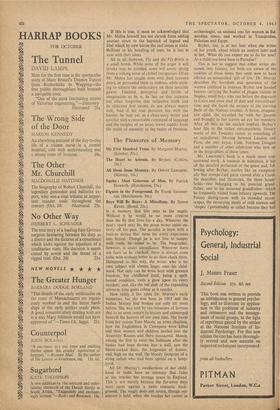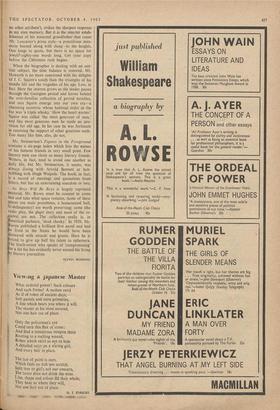The Pleasures of Memory
My First Hundred Years. By Margaret Murray, (Kimber, 30s.) IT is memory that lifts man to the angels. Without it he would be no more creative than the fly that lives for a day. Whatever the poet's spark may be, the prose writer exists en- tirely off his past. The novelist is born with a built-in device that turns his every experience into fiction. Though he is not free to tamper with truth, he seems to be. The biographer, however, is under surveillance. Wherever there are facts to be checked, there is always some critic with nothing better to do than check them. Hampered in this way, the writer who is his own subject will always linger over his child- hood. Not only can he write here with greatest freedom, but childhood itself, being a spell- bound condition, casts a glow upon its every incident; and, like the red shift of the expanding universe, time gains colour as it recedes.
How richly it lies upon Dr. Murray's early memories, for she was born in 1863 and the Indian Mutiny had broken out only six years before. She was told by eye-witnesses of horrors that to us seem remote in history and submerged beneath the horrors of our own time. She learnt from her cousin Tom Moore, an army chaplain, how the Englishmen in Cawnpore were killed and their women and children herded into the Assembly Rooms and there massacred. Moore, among the first to enter the ballroom after the bodies had been thrown into a well, saw the blood-soaked floor, the fragments of dresses, and, high on the wall, the bloody footprint of a dying infant who had been spitted on a lamp- hook.
All Dr. Murray's recollections of her child- hood in India have an intensity that fades as she reaches her teenage years in England. This is not merely because the far-away days were spent against a more romantic back- ground. The magic does not return, though our interest is held, when she reaches her career as archwologist, an unusual one for women in Ed- wardian times, and worked in Transjordan, Palestine and Egypt.
Bryher, too, is at her best when she writes of her youth, about which an analyst later said to her, 'What do you expect me to do for you? As a child you have been in Paradise!'
This is not to suggest that either writer de- scends into fantasy, for both are aware of the realities of those times that seem now to have offered an unequalled 'gift of life.' Dr. Murray describes the boredom and ignorance of the women confined in zenanas. Bryher saw' hooded bearers carrying the bodies of plague victims in Naples; small boys who ran before the dog-carts in Cairo and soon died of dust and over-exhaus- tion; and she faced the menace of the starving Bedu of the Nubian frontier, A brave, imagina- tive child, she travelled far with her parents and brought to he travels an eye for wonders. After all this, as the analyst implied, Bryher's later life in the rather unsympathetic literary world of the Twenties comes as something of an anti-climax. Moving between London and Paris, she met Joyce, Gide, Norman Douglas and a number of other celebrities who turn up in the biographies of those times.
Mr. Lancaster's book is a much more con- centrated work. A memoir in miniature, it has all the detailed perfection of the genre and, fol- lowing after Bryher, startles like an exception- ally fine trompe-rceil piece viewed after a Corot. He describes, and illustrates, the three house- holds—two belonging to his paternal grand- father, one to his maternal grandfather—which he frequently visited from infancy upwards. The Putney dining-room with its crowded storm- scapes, the unvarying meals of cold mutton and 'shapes' ('presumably so called because they had
no other attribute'), strikes the sharpest response in my own memory. But it is the smarter estab- lishment of his maternal grandfather•that raises Mr. Lancaster's prose style—a punctilious man- darin booted along, with slang—to the heights. One longs to quote, but there is no space for jewelsN eighty-one words long. 'Get your copy before the Chtistmas rush begins.
When the biographer is dealing with an out- side subject, the time balance is restored. Mr. Howarth is no more concerned with the delights of J. C. Squire's youth than the triumphs of his middle life and the tragedies of his age. Less, in fact. Here the interest grows as the reader passes through the Georgian period and leaves behind the over-familiar collection of period notables, and sees Squire emerge into our own era—a charming eccentric whose habitual order at the bar was 'a triple whisky.' How the heart warms! Squire was called 'the most generous of men,' and like most generous men he made no pro- vision for old age. In his case he was fortunate in receiving the support of other generous souls. Too many like him, alas, do not.
Mr. Swinnerton's Figures in the Foreground contains a six-page index which lists the names of his famous friends in very small print. Few literary men can claim so many literary friends. Writers, in fact, tend to avoid one another in daily life, but Mr. Swinnerton, it seems, was always dining with Arnold Bennett or hob- nobbing with Hugh Walpole. The book, in fact, is a record of meetings and quotations from letters, but has an entertaining anecdote or two.
As Boys Will Be Boys is largely reprinted material, Mr. Raven must be content to come last and take what space remains. Some of these Pieces (on male prostitutes, a homosexual ball, 1J-delinquency) are worth preserving; some (the radio play, the ghost story and most of the re- views) are not. The collection really is, in theatrical parlance, 'dead cheeky.' In 1959, Mr. Raven published a brilliant first novel and had he lived in the States he would have been showered with awards and grants. Here he is forced to give up half his talent to ephemera. 'the blurb-writer who speaks of 'compromising' for a fat fee has evidently never earned his living bY literary journalism.
OLIVIA MANNING











































 Previous page
Previous page